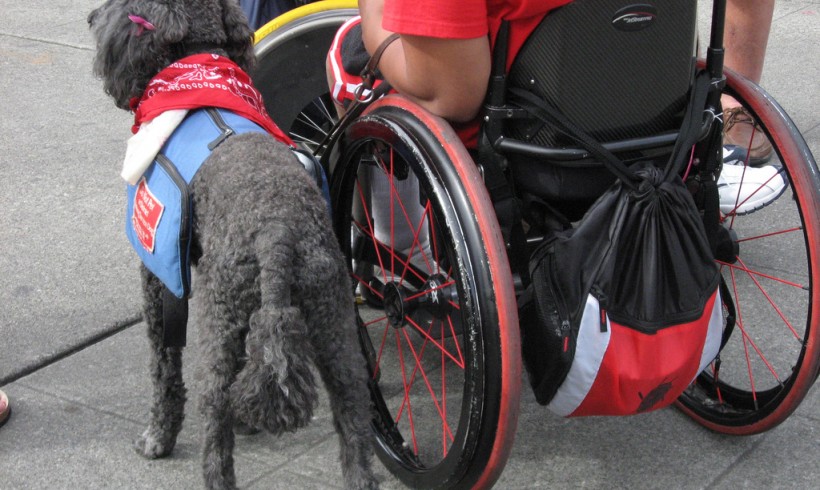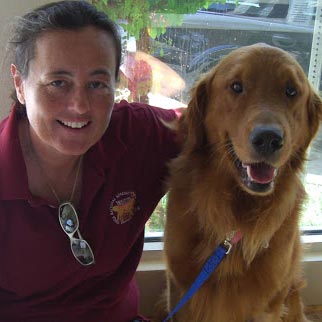No products in the cart.
Therapy Dog Or Service Dog?
Therapy Dog Or Service Dog?
- BADDogs Inc
More and more frequently, we’re receiving calls from folks to find out if we can help train their dogs to be therapy dogs. Or service dogs? What’s the difference, really?
Service dogs are specifically trained to compensate for or assist a person with a recognized disability. Service dogs live with their disabled human handlers in the home, but are not considered pet animals. The activities of service dogs and their disabled human handlers are governed by the Americans With Disabilities Act.
Service dogs have access to all public facilities or those that cater to the public, whether private or governmental. Service dogs may ride in the passenger compartment of public conveyances, such as airplanes, buses, trains, etc.
No one is permitted to request a disabled person to divulge or document their disability, or even to ask what tasks their service dog is trained to perform. Most service dogs wear some sort of vest or jacket that helps to readily identify them as a service dog, but this is not necessary either. Since this is the case, there are many people who claim their dogs are service dogs in order to allow them to gain public access with their dogs, when in fact either the handler has no legitimate disability and/or the dog has not been trained to perform any service tasks.
We are not able to “certify” service dogs, and in fact, there is no service dog “licensing” bodies. A service dog is, by definition, a service dog if s/he is trained to perform some behavior(s) that allow a disabled person to perform routine and necessary tasks so they can get through their normal daily routine.
Some examples of service dog tasks include:
- Opening and closing doors or cabinets
- Turning lights off and on
- Alerting their person to ringing phones or doorbells
- Detecting low blood sugar, seizures or other medical conditions
- Detecting the presence of allergens or other hazardous (to the handler) substances
- Fetching things, or picking up dropped objects
- Bracing/steadying, or helping the disabled person get up or remain steady on their feet
- Helping the person dress and/or undress
- Pulling a wheelchair
We can help you assess your dog’s suitability to perform as a service dog, and can help you train your dog to perform service tasks. Basic service dog training is no different from any other basic training, which helps ensure your dog is controlled and well-behaved in public. If you would like us to help you train your service dog, please be prepared to let us know what types of tasks your dog will need to do for you so we can construct a complete training plan that will suit your needs. Give us a call at 951-283-2101 so we can work out all the details.
Therapy dogs perform services for people other than their handlers. Therapy dogs are considered pet dogs. Therapy dogs must pass a licensing test and receive a credential from a national or local therapy animal organization to be registered to perform therapy work.
Therapy dogs don’t have to be any particular breed or size, but should have solid temperaments, excellent impulse control and be extremely sociable. Most therapy dog training begins with the basics, and progresses to skills classes that prepare them to pass the American Kennel Club’s Canine Good Citizen (CGC) test. From there, individual training should follow the path defined by the handler’s therapy dog agency of choice. National organizations such as The Delta Society and Therapy Dogs International (TDI) have chapters and representatives in most regions of the US. There are also many local agencies one can join that provide standards and support for dog/handler teams who want to do therapy work.
Therapy dog teams can be found visiting folks confined to hospitals, convalescent homes, senior/nursing homes and other therapeutic centers. They also visit senior centers and schools where kids can read to them. One of the newest therapy dog venues is in our court systems, where they can be found providing a secure, calming influence to witnesses (particularly kids) in preparation for the stress of providing their testimony.
Therapy dogs do not have any legal rights to enter any facility, except for those that welcome them for visits. Essentially, outside the facilities where they are working, therapy dogs enjoy no more rights and privileges than any other pet dog.
BADDogs currently has a therapy dog training program; please check our class schedules for dates and times!
Share This Post?
Facebook
Twitter
Pinterest

Recent Articles
About Author

Barbara Davis
I’ve been working with dogs and their people for more than 30 years! I’m certified in dog training by the Certification Council for Professional Dog Trainers, and certified as a Dog Behavior Consultant through the International Association of Animal Behavior Consultants (I’m also a founding member, currently Chair of Dog Division and serve on the faculty of their behavior consulting program, Animal Behavior Consulting: Principles and Practice). I’m also certified in training and behavior by the Association of Animal Behavior Professionals, and serve on their advisory board. I’m pleased to participate as an AKC CGC/S.T.A.R. Puppy program as an Evaluator.
Products
-
 Hazard Avoidance Training
$125.00 – $295.00Rated 0 out of 5
Hazard Avoidance Training
$125.00 – $295.00Rated 0 out of 5 -
 Teenie Tethers
$9.95 – $11.95Rated 0 out of 5
Teenie Tethers
$9.95 – $11.95Rated 0 out of 5 -
 Trainer Packs by Pet Tethers
$45.00 – $70.00Rated 0 out of 5
Trainer Packs by Pet Tethers
$45.00 – $70.00Rated 0 out of 5 -
 Dor-Stopz by Pet Tethers
$11.95 – $65.00Rated 0 out of 5
Dor-Stopz by Pet Tethers
$11.95 – $65.00Rated 0 out of 5
